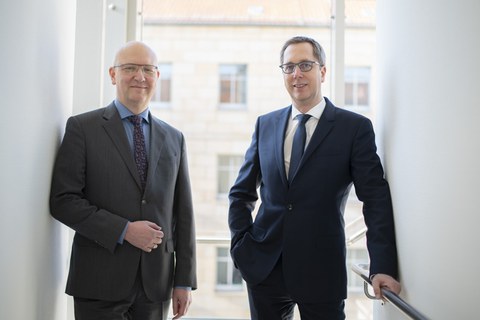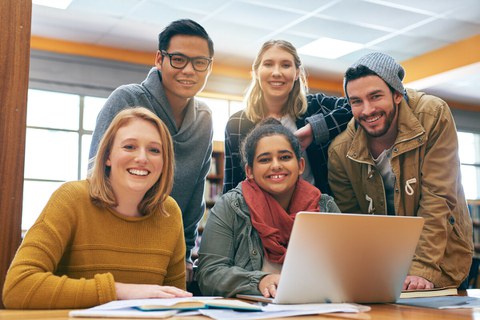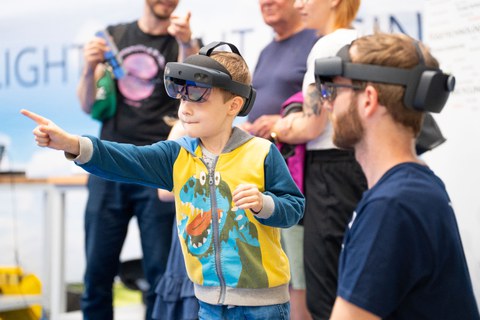Research report 2024
Table of contents
Introduction
An annual review offers the opportunity to reflect on one’s position and adjust course in response to evolving circumstances. Particularly in times of transformation and upheaval, significant opportunities emerge for the development of new technologies and business models. At this pivotal moment, research – built upon scientific insights and coupled with an entrepreneurial mindset – can pave new pathways and initiate the structural transformation that is urgently needed in Germany. We are currently witnessing this dynamic in the field of artificial intelligence, often met with skepticism – some of which is certainly justified. The potential of AI for digitalized lightweight engineering must be scientifically analyzed and strategically harnessed.
With this in mind, we are working intensively on new solutions for green mobility, neutral lightweight engineering as part of the circular economy, and innovative concepts for future energy and process engineering – all while utilizing and adapting emerging AI tools. As such, we are learning to integrate these new tools into our daily research and development methods, allowing us to better understand both their potential and their limitations.
It is no coincidence that the 27th International Dresden Lightweight Engineering Symposium took place in July 2024 under the motto “Neutral Lightweight Engineering – Resilience through Technology Sovereignty.” We were honored to welcome India – a heavyweight in the fields of digitalization and software development – as our partner country, along with 250 distinguished guests. In the run-up to this event, we also launched the 1st National Competence Exhibition KREISLAUF.LEICHTBAU.ERLEBEN. (CYCLE.LIGHTWEIGHT.EXPERIENCE.) – a groundbreaking initiative bridging industry, research, and society in the realm of digitalized lightweight processes. This new format, which was an immediate success with approximately 150 participants, including 150 students and their teachers, is particularly aimed at SMEs and schools. At the National Lightweight Engineering Validation Center (LEIV), we provided hands-on insights into the latest manufacturing technologies for polymer and light metal processing, offering concrete impulses for increasing resource efficiency in manufacturing companies while simultaneously inspiring young minds with a glimpse into the technology landscape of tomorrow. These were just two of the many specialist conferences and exchange formats organized by ILK and its partners in 2024.
With great anticipation, we look forward to the largest European networking and professional event in the field of composite materials. Our successful bid to host the ECCM in Dresden presents a unique opportunity to offer our university – and in particular, the Dresden lightweight engineering community – a special gift in the anniversary year 2028.
Both scientifically and in terms of third-party funding, 2024 was one of ILK’s most successful years, despite challenging economic and funding conditions. Highlights include securing the Collaborative Research Center SFB/TRR 402 in collaboration with colleagues from Aachen and Chemnitz, receiving funding approval for a research aircraft together with the Institute of Aerospace Engineering (ILR) at TU Dresden, the completion of the COMPOLL project in cooperation with IIT Madras and IIT Delhi, and the establishment of the Research Center for Greenhouse Gas-Neutral Circular Economy CircEcon.
We are also particularly proud of our outstanding graduates and staff. For instance, Dipl.-Ing. Leon Schröder received the Johann-Andreas-Schubert Award, while Dr.-Ing. Sebastian Spitzer was honored with the TU Dresden Internationalization Award. The Rolls-Royce Innovation Award and the AVK Award for outstanding research achievements at ILK further round off what has been an exceptional year.
The present may be uncertain, but the future – at least in our view – is not. As an interdisciplinary field, lightweight engineering has always been, and will continue to be, a key discipline in the pursuit of a sustainable and equitable 21st-century economy.
2025… here we come!
Table of Contents
Below you will find a summary of the events at the ILK in 2024
- "syntral" presents itself at the Composites United Project Forum
- Tomorrow begins today: Be part of the first national showcase of expertise "Kreislauf.Leichtbau.Erleben."
- 27TH International Dresden Lightweight Engineering Symposium
- Clean vehicles thanks to digitalization - making the future of mobility sustainable: The project partners of the DigiTain project meet for the 3rd project meeting in Freiburg
- ILK exhibits at the JEC World 2024 in Paris
- Graduation with flying colours: Michael Müller-Pabel successfully defends his dissertation
- 1st National Exhibition of Expertise "Kreislauf.Leichtbau.Erleben" – Building a Bridge between Industry and Education
- Europe-wide unique pilot project for a greenhouse gas-neutral circular economy is underway in Lusatia
- Programme published: The 27th International Dresden Lightweight Engineering Symposium presents eight exciting sessions
- ILK and its expertise represented at the Saxon Cooperation Day
- Workshop area for further training started at Dir des T!Raum-Projekts syntral - Mobile training measures for Lusatia
- The 27th International Dresden Lightweight Engineering Symposium 2024
- Successful defense of the dissertation by Dr.-Ing. Gordon Just
- Global meeting place for composites experts: Dresden to host ECCM23
- ILK supports talented young scientist with sustainable energy solution
- Award for excellent research: ILK graduate Dipl.-Ing. Leon Schröder wins Johann Andreas Schubert Prize
- 'Lightweight Engineering – a Diet Plan for the Heavyweights of Technology' – Prof. Dr.-Ing. Niels Modler as a guest on 'Heimspiel Wissenschaft'
- International Perspectives at the ILK: a Report by a Student Intern
- Climate-friendly aviation – ILK and ILR launch construction of a research aircraft at TU Dresden as an experimental platform for climate-friendly propulsion systems
- Working group meetings of the AGTurbo in Dresden
- Big Ideas – Giant Impact on Engine Weight
- ILK wins AVK prize for innovative product development with RAUCH Landmaschinenfabrik GmbH and thoenes®
- Innovative research meets regional tradition – First status meeting in the syntral project at the National Lightweight Validation Engineering Center Dresden (LEIV)
Research projects
- Research at TU Dresden for innovative aviation propulsion systems of the future – Project: Electrical power units for hybrid-electric drive systems – (ELAN)
- DigiTrain: Digital twins for specialist training
- Erfolgreicher Abschluss des Forschungsprojektes „Hochleistungs-Radiallaufräder in modularer Metall-Faserverbundbauweise (HoRa)“
- Princeton delegation visits TU Dresden: Tour of the Industriepark Schwarze Pumpe in Lusatia
- Cooperation event at the Rectorate of the TU Warsaw on October 3, 2024
- Starting signal for new SFB/TRR project - millions in funding for pioneering lightweight engineering technologies
- Looking back as inspiration, looking to the future: successful final meeting of the METEOR and HyDrun projects
International
- TUD at the German-Korean Junior Forum in Korea
- 3rd Dresden International Colloquium on Tailored Carbon Fibers
- Partnership for innovation and sustainability : ILK in India again - COMPOLL at the DAAD conference
- Call for Participants from Dresden/Germany
- International Perspectives at the ILK: a Report by a Student Intern
- Korea & Germany – Advancing International Discourse in Research and Development
- Award for outstanding cooperation: TU Dresden honors Dr. Sebastian Spitzer
- The international View Beyond the Horizon – From ERASMUS to Academic Employment
An overview of all events can be found here:
In 2024, the ILK was awarded several prizes and honours for its outstanding achievements.
More articles:
- Rolls-Royce Innovation Award: Big Ideas – Giant Impact on Engine Weight
- ILK wins AVK prize for innovative product development with RAUCH Landmaschinenfabrik GmbH and thoenes®
- Award for outstanding cooperation: TU Dresden honors Dr. Sebastian Spitzer
- Award for excellent research: ILK graduate Dipl.-Ing. Leon Schröder wins Johann Andreas Schubert Prize
The scientists at the Institute of Lightweight Engineering and Polymer Technology specialise in nine different expert groups in various fields of lightweight engineering.
The ILK team stands for excellence in functionally integrated lightweight system design, driving the development of high-performance lightweight components and systems with interdisciplinary expertise. Our research is based on the Dresden Model of Functionally Integrated System Lightweight Design in Multi-Material Design, which is recognized internationally as a benchmark for holistic lightweight strategies. With its unique approach – ranging from the atomic level to complex overall systems – we set new standards in materials and manufacturing research. Through collaborative research projects, where the ILK often takes the lead as initiator and coordinator, we create groundbreaking innovations that accelerate industrial application. This ensures long-term partnerships with industry and academia while driving sustainable technological progress.
Discover our projects of the year 2024 and be inspired by our research initiatives.
Get an overview of all projects at the ILK in 2024
All scientific publications of the ILK can be found here:
Detailed information on the individual dissertations, including their core research areas and results, can be found on the following page:
Overview of successful dissertations in 2024
2024
-
Modellierung des Schädigungsverhaltens multiaxial verstärkter Faser-Kunststoff-Verbunde unter quasi-statischer und zyklischer Belastung, 11 Sep 2024, Technische Universität Dresden, 130 p.Electronic (full-text) versionResearch output: Types of Thesis > Doctoral thesis
-
Zur Verbesserung des Impactverhaltens von Faser-Kunststoff-Verbund-Strukturen mittels maßgeschneiderter Zwischenschichtmodifikationen, 18 Jul 2024, Technische Universität Dresden, 153 p.Electronic (full-text) versionResearch output: Types of Thesis > Doctoral thesis
-
Methodische Entwicklung funktionsintegrierender Bauweisen induktiver Ladesysteme für Elektrofahrzeuge, 1 May 2024, Technische Universität Dresden, 184 p.Research output: Types of Thesis > Doctoral thesis
-
Modellierung des vernetzungsabhängigen Materialverhaltens duroplastischer Matrices als Grundlage für die werkstoffgerechte Prozess- und Bauteilgestaltung, 15 Apr 2024, Technische Universität Dresden, 128 p.Electronic (full-text) versionResearch output: Types of Thesis > Doctoral thesis
-
Beitrag zur Herstellung und zu den Prozess-Struktur-Eigenschafts-Beziehungen von Kohlenstofffasern, 2024, 239 p.Research output: Types of Thesis > Doctoral thesis
The ILK offers a unique study program in lightweight engineering, combining theory and practice at the highest level. The foundation of this education is the Dresden Model of Functionally Integrated System Lightweight Design in Multi-Material Systems, which is recognized as an international benchmark. The latest ILK research findings are directly integrated into the curriculum, ensuring education at the cutting edge of science. Additionally, students benefit from guest lectures by leading industry experts, providing valuable insights into practical applications. Early involvement in innovative research projects at ILK enables them to gain in-depth technical knowledge, interdisciplinary skills, and hands-on experience. Graduates of the Dresden School of Lightweight Engineering pursue careers in industry and academia, taking on specialist and leadership roles in various fields of application.
International experience at the ILK
International exchange and intercultural networking play a central role at ILK. Students from around the world bring new perspectives to research and use the institute as a platform for their academic and professional development. Whether through Erasmus stays, international internships, or direct involvement in research projects, the diverse experiences of international students highlight the extent to which a global perspective enriches scientific progress. In personal accounts, they reflect on their challenges, opportunities, and insights. Learn more about how international talents at ILK are shaping their path in research and industry:
- International Perspectives at the ILK: a Report by a Student Intern
- The international View Beyond the Horizon – From ERASMUS to Academic Employment
Get Together
As every year, the institute kicks off the winter semester with the Get Together of the Lightweight Engineering department. This event offers students the opportunity to connect in a relaxed atmosphere and become part of the academic community.
In addition to social exchange, the event serves as a valuable platform for engaging with professors, lecturers, and ILK staff to learn about opportunities for student positions, such as research assistant roles or project work. Find out what made this evening special here:
GetTogether 2024 – Networking and Exchange at the Start of the Semester
The Akademischer Club Leichtbau e.V. at the TU Dresden (ACL)
The ACL connects graduates, researchers, and supporters of the ILK, fostering professional exchange. Since 2003, it has served as a central platform for knowledge transfer and collaboration between students and experts in the field of lightweight engineering. Through events and personal connections, the association supports education, research, and the development of cooperative networks. Learn more about the ACL’s activities in 2024 and key contacts here:
Academic Club Lightweight Engineering e.V. at the TU Dresden
In light of the increasing shortage of skilled professionals and the declining number of students in mechanical engineering, targeted support for young scientific and technical talent is of paramount importance. The Institute for Lightweight Engineering and Polymer Technology (ILK) therefore pursues a comprehensive approach to inspiring young minds early on and providing them with profound insights into the diverse educational and career opportunities within this forward-looking discipline.
A central pillar of this initiative is the integration of theoretical knowledge transfer with hands-on experience. Short-term programs such as Girls’ Day, SCHAU REIN!, topic-specific workshops, and career orientation events at schools offer initial exposure to engineering-related topics. Long-term formats, including summer schools, scientific project weeks, and trial study programs, further nurture this interest and allow prospective students to actively engage with the interdisciplinary challenges of modern lightweight engineering. This portfolio is complemented by student internships, which offer direct insight into cutting-edge research and development at ILK.
In 2024, numerous measures have once again been implemented to support the next generation of engineers, unlock their innovative potential, and prepare them for a promising academic and professional career in lightweight engineering. After all, the sustainable progress of this key technology is inextricably linked to the excellence and creativity of future experts.
Learn more about our initiatives for young talent: Young Talent Activities 2024




